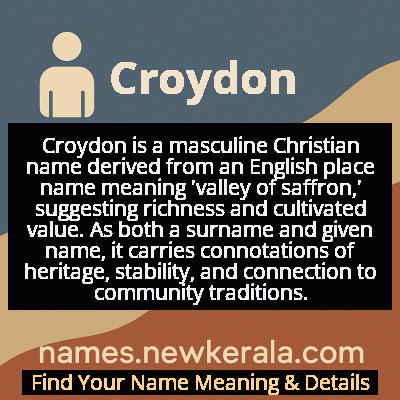Croydon Name Meaning & Details
Origin, Popularity, Numerology Analysis & Name Meaning of Croydon
Discover the origin, meaning, and cultural significance of the name CROYDON. Delve into its historical roots and explore the lasting impact it has had on communities and traditions.
Name
Croydon
Gender
Male
Origin
Christian
Lucky Number
4
Meaning of the Name - Croydon
Croydon is a masculine Christian name derived from an English place name meaning 'valley of saffron,' suggesting richness and cultivated value. As both a surname and given name, it carries connotations of heritage, stability, and connection to community traditions.
Croydon - Complete Numerology Analysis
Your Numerology Number
Based on Pythagorean Numerology System
Ruling Planet
Uranus (Rahu)
Positive Nature
Strong sense of order, loyal, practical, and disciplined.
Negative Traits
Stubborn, overly serious, rigid, and prone to feeling restricted.
Lucky Colours
Blue, gray.
Lucky Days
Saturday.
Lucky Stones
Blue sapphire.
Harmony Numbers
1, 7, 8.
Best Suited Professions
Managers, engineers, accountants, organizers.
What People Like About You
Dependability, discipline, practicality.
Famous People Named Croydon
Croydon Foster
Politician
Served in Queensland Legislative Assembly and contributed to early Australian governance
Croydon Smith
Businessman
Built successful manufacturing enterprise and supported local community initiatives
Croydon Williams
Religious leader
Led Methodist congregations and developed innovative community outreach programs
Name Variations & International Equivalents
Click on blue names to explore their detailed meanings. Gray names with will be available soon.
Cultural & Historical Significance
In Christian naming traditions, Croydon fits within the pattern of using meaningful place names that reflect God's creation and human settlement within it. The name's connection to saffron cultivation carries subtle biblical resonance, as spices and valuable commodities often appear in scripture as symbols of worth, sacrifice, and divine blessing. As a modern given name, it continues the Christian practice of selecting names with positive connotations and historical depth, while allowing for individual identity formation within faith communities that value both tradition and personal meaning.
Extended Personality Analysis
Individuals named Croydon are often perceived as grounded and practical, with a strong connection to tradition and heritage. They typically exhibit reliability and steadfastness, reflecting the name's origins as both a place name and surname that suggests stability and rootedness. These individuals often possess a quiet confidence and methodical approach to life, valuing consistency and dependability in their personal and professional relationships. Their connection to the name's geographical origins may manifest as an appreciation for history, community, and tangible achievements rather than fleeting trends or superficial pursuits.
In social contexts, Croydons are often seen as the steady anchors in their circles - people who remember traditions, maintain connections, and provide stable support. They tend to be thoughtful decision-makers who consider long-term consequences rather than acting impulsively. Their strength lies in their persistence and loyalty, qualities that make them valued team members, trusted friends, and reliable family members. While they may not seek the spotlight, their consistent presence and dependable nature often make them foundational figures in their communities and workplaces. This personality profile aligns with Christian values of steadfast faith, community service, and faithful perseverance through life's challenges.
Modern Usage & Popularity
In contemporary naming practices, Croydon remains primarily a surname but has seen occasional use as a masculine given name, particularly in English-speaking countries with strong British heritage connections. Its usage as a first name is relatively rare but has maintained consistent, though modest, popularity among families seeking distinctive yet traditional-sounding names. The name appeals to parents interested in geographical names or those with family connections to the London borough of Croydon. Recent years have seen a slight increase in its use as part of the trend toward unique surname-names, though it remains outside the top 1000 names in most English-speaking countries. Its strongest usage continues to be in the United Kingdom, Australia, and New Zealand, where British place names have cultural resonance, and it occasionally appears in Christian communities valuing names with historical depth and positive connotations.
Symbolic & Spiritual Meanings
Symbolically, Croydon represents rootedness, heritage, and the intersection of rural and urban values. The 'saffron valley' etymology suggests richness, value, and cultivation - saffron being one of the world's most precious spices historically. This connects to themes of abundance, worth, and the fruits of careful labor. As a place-derived name, it symbolizes connection to land and community, embodying stability and continuity across generations. The name also carries metaphorical significance as a bridge between past and present, tradition and progress, reflecting how geographical names often represent both historical legacy and contemporary identity. In Christian contexts, it can symbolize the cultivation of spiritual virtues and the value of community in faith practice, while the saffron connection subtly echoes biblical themes of precious offerings and divine blessing.

